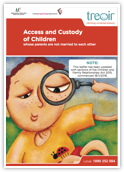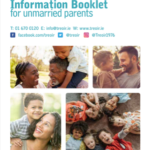Access is the right of a child and a parent and/or guardian who do not live together to spend time together. This right can also be granted to relatives and others.
Where parents are not living together it may be possible to come to an informal arrangement whereby the non-resident parent may have access to his/her child on a regular basis without having to go to Court.
If parents are having difficulty in making arrangements regarding access they could consider Mediation or Collaborative Law (see below). If the parents cannot reach an agreement informally, the non-resident parent may apply to the local District Court for an Access Order. The court may set the time, place and duration of access.
As with all cases involving children, any decision made by the court will be made in the best interests of the child and the court will consider the views of the child where possible given his/her age and understanding. A non-resident parent is usually granted access. Access can also be applied for where a child is in the care of TUSLA, the Child and Family Agency.
Before making an application for access the Court form 58.49 – Statement of Arrangements for Child can be completed. Most Courthouses require this form to be completed – but not all of them. Please give us a call if you are unsure whether or not your local courthouse requires you to complete form 58.49 before making the application for access.
To officially apply for Access to your child, if you are not a guardian, you would first complete Court Form 58.19 – Notice of Application under for Access of a child. This form is used to formally notify the court and relevant parties that an application for access is being made. It outlines the applicant’s intention to seek access rights and sets the process in motion.
For relatives and certain other persons
If it is not possible to agree arrangements, any person who is related to the child (grandparents, brothers, sisters, aunts, uncles), including by adoption, and any person with whom the child has resided, may apply to the local District Court for an access order in relation to the child. To download court forms see below. Access can also be applied for if a child is in the care of TUSLA, the Child and Family Agency. Any decision made by the court will be made in the best interests of the child and the court will consider the views of the child where possible given his/her age and understanding. The court will also consider:
- the applicant’s connection with the child
- the risk if any, of the application disrupting the child’s life to the extent that the child would be harmed by the access
- the wishes of the child’s guardians
- whether or not an access order is necessary.
Custody is having the responsibility for the day-to-day care of a child.
For Parents
The mother of a child born outside marriage has automatic sole custody of her child. Where both parents agree, it is possible for them to share custody (joint custody) of the child on an informal basis. If parents are having difficulty agreeing joint custody they could attend mediation or collaborative law.
Where the parents cannot agree on joint custody the father can apply to the local district court for joint or sole custody. To download court forms, see below. The other parent and any other guardian will be informed of the application and any decision made by the court will be made in the best interests of the child. The court will consider the views of the child where possible given his/her age and understanding.
It is possible for a child’s father to apply for sole custody of his child.
For relatives and certain other persons
The court may make an order for custody on application by:
- a person who is a relative of a child (grandparents, brothers, sisters, aunts, uncles), or
- a person with whom the child resides if that person is or was married to, or in a civil partnership with, or has cohabited with the parent of the child for a period of at least 3 years and has shared the day-to-day care of the child for at least 2 years, or
- a person with whom the child resides and who has had the day-to-day care of the child for a continuous period of not less than 12 months and the child has no parent or guardian who is willing or able to exercise the rights and responsibilities of guardianship in respect of the child.
Before making an order for custody the court will require the consent of all guardians. However, the court may dispense with the need for consent if it is satisfied that it is in the best interests of the child to do so. Any decision made by the court will be made in the best interests of the child and the court will consider the views of the child where possible given his/her age and understanding.
The court can also make an order for joint custody and specify where the child is to live. Where the child is not living with one of his/her parents, for any period, the court can specify what access arrangements, if any, are to be put in place.
If you are having difficulty in agreeing parenting issues you might think about mediation. Mediation is where a third party, the mediator, helps parents/guardians/family members reach agreement. Mediation encourages all parties to co-operate with each other in working out arrangements concerning their children. Any written agreement can be made a Rule of Court (see below).
NOTE: mediation is currently available through local district courts located in Dublin (Dolphin House), Naas, Nenagh, Clonmel, Limerick City, Cork City, Carlow, Ennis and Tralee. Check with your local district court for availability.
The Family Mediation Service: 01-874 7446, www.legalaid.ie
Mediators’ Institute of Ireland: 01-609 9190, www.themii.ie
Dublin Community Mediation: 089 9633170, www.dcmhelp.ie
Collaborative law is where parents/guardians/family members work with specially trained lawyers, receive legal advice and guidance, and together with the lawyers, discuss and attempt to resolve issues through face-to-face meetings. Decisions are made by the parties involved. A written agreement can be made a Rule of Court (see below).
Association of Collaborative Practitioners: www.acp.ie
Legal Aid Board: LoCall 0818 615 200, www.legalaid.ie
If you are not happy with a decision made by the court you have 14 days in which to appeal. The terms of the order will come into force while waiting for the appeal unless a court directs differently.
Where an agreement for custody and/or access is entered into and made in writing (including written agreements made during mediation), an application can then be made to court for an order to make that agreement a Rule of Court. The court may make an order if it is satisfied that the agreement is fair and reasonable and adequately protects the interests of the child. The agreement then has the same standing as a court order. A written agreement that is not made a Rule of Court is NOT legally binding.
Where there is a court order in place for either access or custody and the access or custody is either unreasonably denied or not taken up, a parent/guardian of the child may apply to the court for an ‘enforcement order’ (see District Court Form: 58.43). Before making an enforcement order the court will consider the views of the child where possible given his/her age and understanding.
The enforcement order may provide for one or more of the following:
- that a parent and/or guardian be granted additional access to the child
- that a parent and/or guardian be reimbursed for any expenses they may have had as a result of the refusal to either take up or allow the access
- that either or both parties do one or more of the following: receive information about the availability of mediation, attend a parenting programme, attend family counselling.
If a court order becomes difficult to implement it is possible to go back to the court at any time to look for a ‘variation order’ in order to make changes to the original court order. An application can also be made to terminate an order. See District Court Form: 58.22.
If your child is not living in Ireland and you, as a parent and/or guardian, do not have access arrangements in place, it may be possible for you to establish access arrangements with your child. This may also apply where a person other than a parent/guardian has a court order for access in respect of a child and that child is no longer living in Ireland. An access application form and further details can be obtained from the Central Authority in Ireland.
(Tel: 01 479 0200). See contact details for all Central Authorities.
Notes:
- Before making an applications for access/custody/joint custody, court Form No. 58.49 must be completed. This form is a ‘Statement of Arrangements for Child’. Download here
- A father can apply for access and custody whether or not his name is on his child’s birth certificate and whether or not he is a joint guardian.
- Where access, custody and/or guardianship are being applied for, separate applications for each must be made to the court but all applications may be heard at the same hearing.
- Family law court hearings are not open to the general public.
- It is possible to represent yourself in the District Court.
- It may be possible to qualify for legal aid. Contact the Legal Aid Board: LoCall 1890 615 200, www.legalaid.ie


